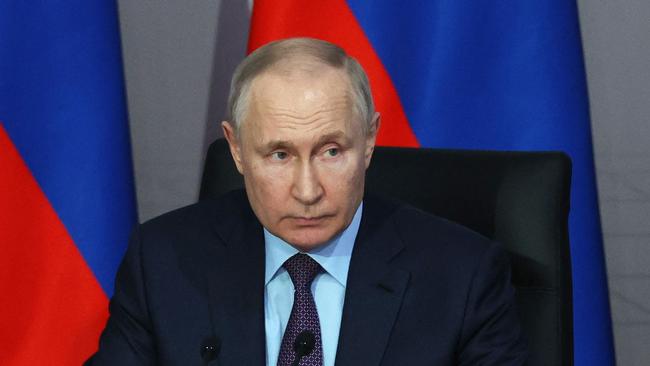Podcast review: New series from The Economist Next Year in Moscow remembers Russians captured by Putin’s war
A new series from The Economist wants us to remember the Russians suffering under the leadership of Putin while the world watches what happens in Ukraine.

When Russian leader Vladimir Putin sent 200,000 troops into Ukraine he launched the biggest European military invasion since the end of WWII.
After more than a year there have likely been hundreds of thousands of casualties, as well as economic sanctions and a series of Russian military failures that have annihilated Putin’s authority – at least outside of Russia.
The Russian president has commanded a lot of attention over the course of the ill-advised war and it’s easy to see why.
Putin controls the troops and guns but he’s also a bit of a characte. The 70-year-old dates a gymnast who has somehow amassed a fortune, has ridden a horse shirtless and has been filmed singing Blueberry Hill (the clip is on YouTube).
Putin is either a man of multitudes or a figure who dutifully follows the advice of his public relations team. He’d be a quixotic character if so many people hadn’t died on his mad quest, the reasons for which keep shifting. Is the war with Ukraine about glory, nationalism or pure ego?
A new series from The Economist wants us to remember the Russians suffering under the leadership of Putin while the world watches what happens in Ukraine. Next Year in Moscow is a gentle podcast about a hard war and casts an empathetic angle on a story dominated by powerful men and munitions.
This reviewer is reminded of the groundbreaking work of Australian historian Sheila Fitzpatrick, who brought the experiences of the citizens of the USSR to the forefront of history.
Journalist Arkady Ostrovsky tells listeners on episode one that the ground was shifting under Russia as its first militia breached the Ukrainian border.
“Because by bombing Ukraine, Russia was engaging, and not for the first time, in an act of self-destruction, attacking its own future,” he says.
“This is a story of Russians who oppose the war for Ukrainians’ sake and their own.”
It’s personal for Ostrovsky. He was raised in the then Union of Soviet Socialist Republics before leaving to study and live in Britain.
Hearing from the voices of Russians is sobering. You realise how much of their story has been lost in coverage of the war.
One woman says “What can a normal person think when one morning he or she wakes up and realises (their) country has gone for a full-fledged invasion of the neighbouring country?”
A man says he remembers the feeling that everything had changed in a second. Another woman says the invasion was the total crash of her hopes and dreams.
Ostrovsky speaks with a soft Russian accent and gives beautiful descriptions of a country wracked with confusion.
“Black cars with sirens, flashing lights and tinted windows zipped around the city,” he tells listeners on episode one.
“They carried Russian officials meeting each other in person, too scared presumably to talk on the phone about what had just happened.
“The police closed in on the city, putting up fences where people were likely to gather as if the Kremlin were preparing for an attack on its own soil.”
Tipsy Tolstoy – For listeners who like a vino with their War and Peace
Russia, If You’re Listening – From the ABC, the podcast is a bit dated but a good catch up on what happened in 2022
Svetlana! Svetlana! – The story of how Joseph Stalin’s daughter Svetlana Alliluyeva fled the USSR in 1967




To join the conversation, please log in. Don't have an account? Register
Join the conversation, you are commenting as Logout